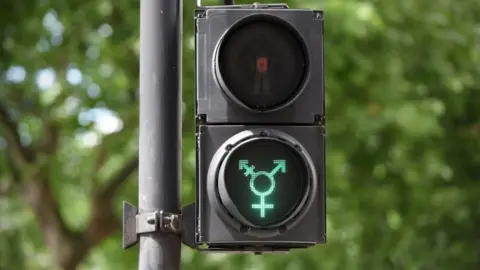Self-ID for transgender people 'unlikely' to get ministers' support
 BBC
BBCMinisters are unlikely to back a major reform to the Gender Recognition Act, it is understood, amid fresh uncertainty over when the government will actually announce its plans.
Sources have indicated the government is not expected to support what's known as "self-ID", whereby a trans person could legally change their gender without, for example, a medical diagnosis.
The issue of self-identification has been the subject of a highly charged debate in recent years.
Last month, the government said it would publish its long-awaited response to a consultation on the act in July and there had been some expectation it could come as soon as this week.
But a statement from the Government Equalities Office outlines a vaguer "intention" to publish a response this summer, which would apply to England and Wales.
Senior Whitehall sources have suggested that an announcement this week is now very unlikely.
That doesn't leave a lot of time before parliament breaks up next Wednesday for the summer recess.
It all perhaps reflects how ministers have struggled to formulate a policy on what has become a deeply contentious issue.
Self-identification could see trans people being able to change their birth certificate, and have their identity legally recognised, without the need to prove their lived in gender or have a medical diagnosis.
Those advocating reform say the current process is outdated, expensive and intrusive.
But some groups have voiced concerns about what self-ID could mean for areas like single sex spaces and women's sport.
In 2017 Theresa May talked about a wish to "streamline and de-medicalise" the process to reflect that "being trans is not an illness".
A consultation on reforming the GRA was launched the following year - and received more than 100,000 responses.
But one new PM and several Equalities ministers later, it's understood that there are now significant concerns within government about how that consultation was carried out - one source has described the process as having been "deeply flawed".
That assertion may raise some sceptical eyebrows - but it also raises questions over whether ministers now see this prolonged consultation exercise as the right vehicle with which to drive through reforms.

To change a birth certificate most applicants have to:
- Provide two medical reports, one showing a diagnosis of "gender dysphoria" and the other outlining details of treatment received
- Obtain the consent of their spouse if they are married
- Demonstrate that they have lived in their acquired gender for at least two years
- Pay £140

An obvious but important caveat; there are lots of different views within different communities when it comes to potential reform of the 2004 Gender Recognition Act.
Among them, groups who believe that female voices have been sidelined in a debate that both affects women and sets parameters around what it means to be female.
There are also those in the LGBT+ community who warn that Boris Johnson could face his own "Section 28 moment" should he oversee any "rollback" of trans rights.
Insiders insist there will be no rollback but it does seem as though the government is looking to take what's being termed as a more gradual approach to reforms.
There could still be some streamlining of the process; sources have indicated that issues like the cost of getting a certificate have been under consideration.
And yes things could yet change - I've heard suggestions that ministers are "feeling the heat" as they're lobbied, at what may be the 11th hour, by different sides of the debate.
However there may be little sympathy in some quarters for the situation that the government finds itself in.
Yes, the ministerial baton has changed hands a few times but there is nevertheless a feeling that a Conservative government raised expectations, that self-ID was en route, before exiting the scene as a debate raged.
The Minister for Women and Equalities, Liz Truss, did discuss the matter publicly in April - describing the protection of single sex spaces as "extremely important".
Another priority, she said, was ensuring that transgender adults are "free to live their lives as they wish without fear of persecution, whilst maintaining the proper checks and balances in the system".
But critics feel that overall there's been increasingly little leadership or clarity on what's to come.
"The silence is what people have read," said one senior figure in the LGBT+ community.
That silence may soon be broken but it will come off the back of delays, missed deadlines and accusations that the whole thing has been badly handled.
Whenever the announcement is made, it seems almost impossible that the government can avoid serious criticism, one way or another.
